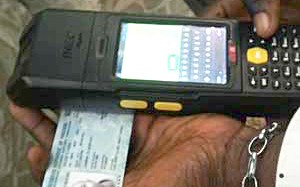Opinion – Card Readers: What INEC Should Still Do By Adewale Kupoluyi
Articles/Opinion, Featured Contributors/Columnists, Latest Headlines, Nigeria 2015 Election Saturday, March 14th, 2015
Despite all odds, the doggedness of the Independent National Electoral Commission (INEC) to use the card reader for the forthcoming general elections is highly commendable. Since INEC made public its intention known to bring sanity into the electoral process this time around through the use of Permanent Voter Cards (PVCs) as well as the Smart Card Reader (SCR), the commission has come under intense attacks from the various political interests, who many observers believe, are threatened that with the adoption of the machine, it may be difficult to manipulate the process any longer. The card reader is a simple device that authenticates a voter by matching the fingerprint with the code on the chip of a card and keeping a record of all cards that had been read and verified. It is designed in such a way that it is capable of eliminating multiple voting to almost a zero level, thus cutting off a major source of election fraud from the polity.
For the first time in the annals of the nation’s electioneering, the electoral body is introducing the card reader aimed at curbing electoral malpractices and INEC said the device would be deployed in all the polling units as well as voting centres across the country. In view of its many inherent advantages of significantly limiting rigging and fraud in the course of conducting proper accreditation of voters, those still opposed to the use of card readers claim that the machine had not been well tested and as such, could not be trusted for use now.
We recall that a group of political parties were the first to join the ruling Peoples Democratic Party (PDP) in opposing the use of card readers in accrediting voters while the All Progressives Congress (APC) supports its use. To the critics, the use of card readers for the elections would rather aid the opposition parties’ vested interest to allegedly manipulate the exercise to favour particular candidates and disenfranchise many registered voters or likely winners. They also insisted that the use of the electronic device was against the 1999 Constitution (as amended) as well as the 2010 Electoral Act (as amended), which outlawed electronic voting in the country.
Among other efforts at clearing the doubts, Professor Attahiru Jega, the INEC Chairman was recently invited to the Senate, where the workability of the card reader was proven. At the end, it was agreed that INEC could go ahead with its plan to use the device as obtainable in other progressive nations of the world. With the nod by the Senate, the mock voters’ accreditation was conducted in select constituencies across the nation and its outcome was a mixed grill. In carrying out the mock experimentation, INEC chose one Registration Area in each of the nation’s 12 selected states – Anambra, Bauchi, Ebonyi, Ekiti, Delta, Lagos, Rivers, Kano, Kebbi, Nasarawa, Niger and Taraba – to test the workability and efficacy of the device. Notwithstanding a few hiccups encountered, the mock voters’ accreditation was largely successful. This could have led to the wide approval granted thereafter by critical stakeholders such as the civil society groups, respected opinion leaders and international observers, who applauded the exercise.
Now that the coast is clear for INEC to use the 182,000 card readers it has acquired, there’s still the need redress some lapses observed during the mock trial before the elections finally begin in a matter of days. There is also the need to get it right so as to prove cynics wrong that the card readers can actually work effectively! This remains a major challenge before the electoral body. To begin with, it should ensure that the card reader batteries are fully charged and well preserved such that they do not run down within the hours of use. Secondly, there is the need to reduce to the barest minimum, the stress being encountered in the process of authenticating registered voters as many of them, who had presented their cards during the exercise could still not be identified.
Furthermore, it is imperative to record an improvement over the period used by the machine to clear the prospective voters by reducing the waiting period. When the waiting period becomes unnecessarily too long, it becomes Herculean to manage large crowds that could eventually turn up for voting. The commission should also address the not-too-pleasant experience recorded when some people were made to resort into washing of hands before the machine could read them. For instance, when this problem persisted, INEC staff on ground were said to have resorted to using their personal handkerchiefs to clean the fingers of the affected people. And at the end, it still did not work for some people. Eligible voters should not be disenfranchised for any reason whatsoever.
It should be appreciated that conducting of credible elections remains the right course to attaining sustainable democracy. The use of card readers, from the available information is not electronic voting but an innovation that would promote the electoral process by empowering voters to elect candidates of their choice meaning that votes would actually count. But when this is not done and people’s representatives are not credibly chosen, violence, hatred, chaos, anger and crisis become the order of the day. This makes it possible for the wrong persons to occupy elective office without any articulated programmes and policies to address the needs of the state and the citizens. And who suffers? The nation and its people, of course. That is why every effort at holding free, fair, transparent and credible polls should not be wished away.
As a fall-out of the INEC’s mock trial, the introduction of the “incident form”, in which voters with an unverified fingerprint would fill and then be allowed to vote, the procurement of 35,000 back-up batteries for the card readers and 20,000 back-up card readers, are welcome development. With just a few days to go, the electoral umpire should go back to the drawing table to re-strategize. Let me add that undue interference and pressure on the electoral body by desperate political interests are not only unhealthy but distractive and burdensome in the build up to the elections. This should stop forthwith and INEC should be allowed to perform its constitutional responsibility without any unnecessary encumbrances.
Kupoluyi writes from Federal University of Agriculture, Abeokuta (FUNAAB), adewalekupoluyi@yahoo.co.uk, Twitter; @AdewaleKupoluyi, Blog; www.adewalekupoluyi.blogspot.com
Related Posts
Short URL: https://www.africanexaminer.com/?p=22711





















